Concepts in Oracle PPM Cloud – Project Execution Management (PEM)
Table of Contents
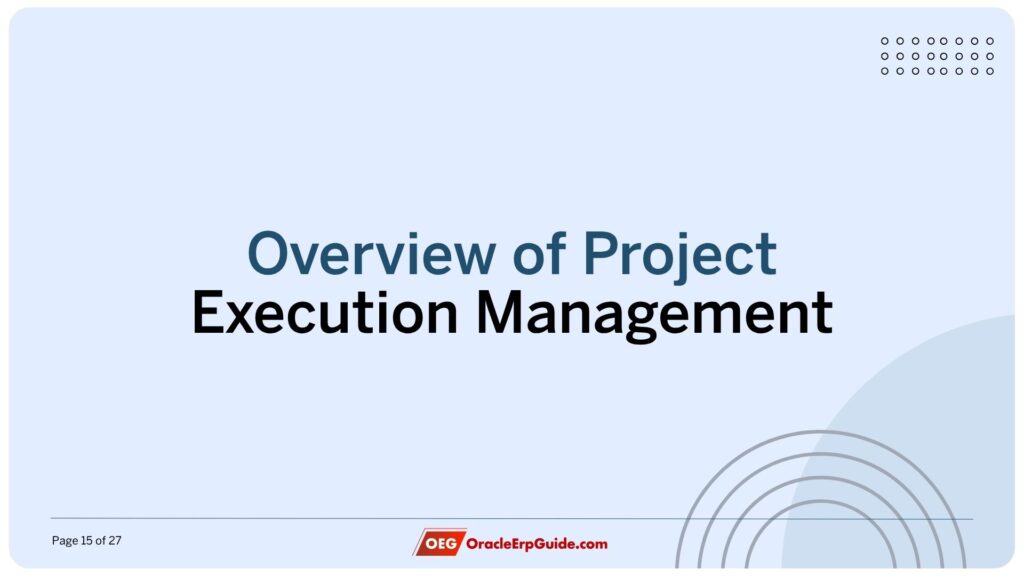
Project Execution Management in Oracle PPM Cloud focuses on the operational aspects of project management, specifically addressing planning, task management, and resource management.
This module enables organizations, particularly in the professional services industry like IT and consulting companies, to efficiently manage and execute projects by planning activities, allocating resources, and ensuring smooth task execution. While project financial management addresses the financial aspects, including budgeting, cost collection, and billing, project execution management emphasizes the physical execution of the project itself.
Users can plan the activities, schedule tasks, and manage resources effectively, with integrations available to other modules like HCM (Human Capital Management) to streamline resource planning.
The integration of Project Execution Management with Project Financial Management allows seamless interaction between the execution and financial components of a project.
For example, as projects progress, resource allocation and scheduling are handled in execution management, and the financial implications—such as budgeting and cost management—are automatically linked through the financial management module. This ensures that all project-related aspects are tracked in real-time, helping organizations maintain control over both the operational and financial sides of the project.
Although the primary integration is with project financial management, there is also indirect connectivity with other Oracle modules such as AR (Accounts Receivable), GL (General Ledger), and Purchasing, providing a comprehensive project management solution.
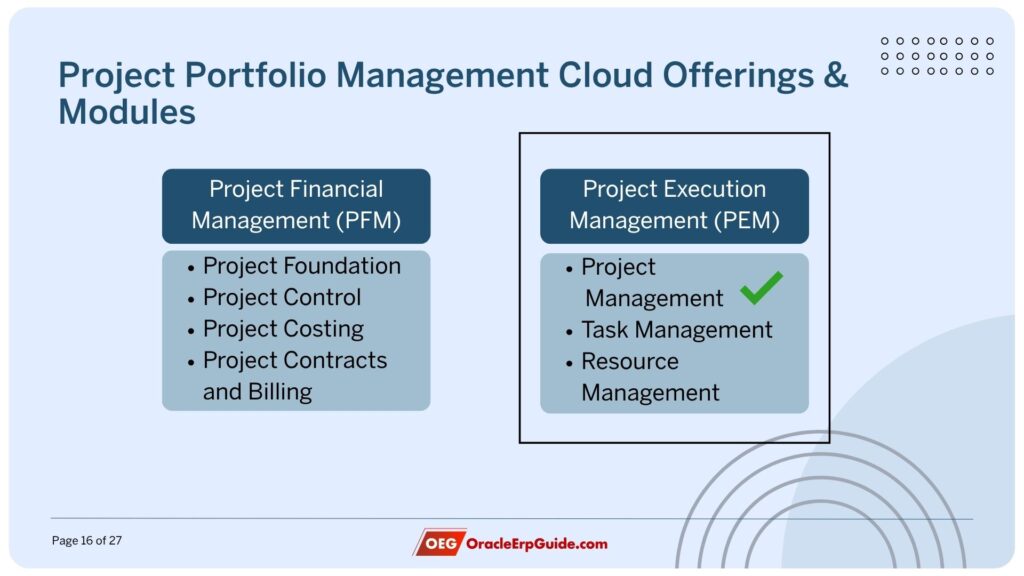
Project Life Cycle
The project life cycle encompasses both project execution and financial management, with integration between these two aspects. Initially, a project is created, planned, and scheduled by the project manager, who also requests resources for the project. These resources are identified and assigned by a resource manager. Financial management can be optionally enabled for cost collection, billing, and revenue processes. While project execution management allows detailed planning, scheduling, and resource management, financial management focuses on aspects like cost estimation and billing but lacks the detailed project management features such as Gantt charts or resource utilization calculations. Understanding the distinction between project execution and financial management helps in optimizing project workflows and leveraging the appropriate tools for specific needs.
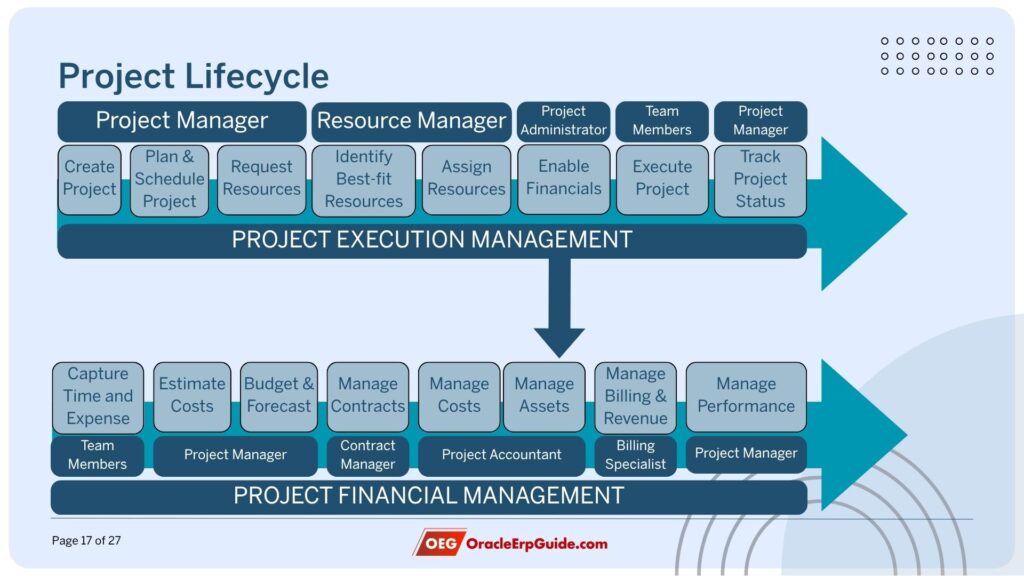
🚀 Kickstart Your Oracle ERP Career with OEG One
Get full-year access to live trainings, recordings, hands-on practice, and expert resources—all in one place with OEG One. Perfect for building or boosting your Oracle Fusion or EBS skills.
💡 Explore free content before you commit:
Try Free ContentProject Execution Management Lifecycle
Execution management allows projects to be created either from scratch or using a work plan template, offering flexibility unlike financial management, which requires a project template tied to a work breakdown structure. Once created, projects can be saved as templates for future use. The focus is on work planning, resource allocation, and task dependencies, with no involvement in financial aspects like accounting entries. Key stages include defining milestones (e.g., User Acceptance Testing sign-offs) and managing resource requests based on skill sets. Resource utilization is tracked to ensure optimal allocation, impacting performance evaluations.
Issues such as scope changes, resource unavailability, or client-requested modifications are documented and addressed to keep the project on track. Progress is monitored through deliverables and expressed as a percentage of completion. Significant changes are managed through change orders, which may also impact the project budget. Overall, execution management ensures that projects are completed on time, within scope, and within budget, with a focus on key elements like resource management, project rules, and calendars for smooth project delivery.
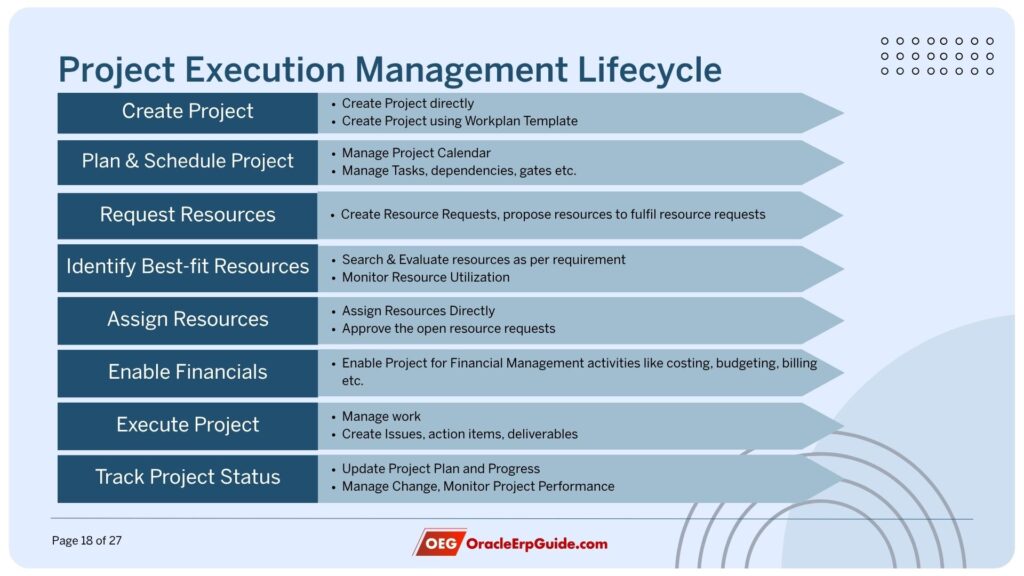
Common Project Execution Management Options
In Project Execution Management (PEM), one of the key roles is the Project Implementation Administrator, responsible for managing user provisioning, project rules, project and resource calendars, and project enterprise resources. This role is distinct from the Project Administrator in Project Financial Management (PFM), which focuses on creating projects within financial management. The Project Implementation Administrator, sometimes referred to as the Project Application Administrator, has a broader scope in PEM, and it’s important not to confuse the two. The role provides access to all PEM setups, enabling the administrator to complete setups, create users, and designate some of them as project managers.
In addition to these tasks, the Project Implementation Administrator is involved in user provisioning, which is the process of creating user accounts for PEM resources. Another critical responsibility is creating project rules, which differ from financial management rules. While financial management includes roles like Project Administrator and Project Accountant, PEM includes roles such as Project Team Member, Project Manager, and Project Executive. The role also manages project and resource calendars, which should not be confused with accounting calendars. Finally, project enterprise resources—a term Oracle uses for project resources—are necessary to work within PEM. Only individuals designated as project enterprise resources can engage in PEM projects, making this a crucial prerequisite for working in the Project Execution Management module.
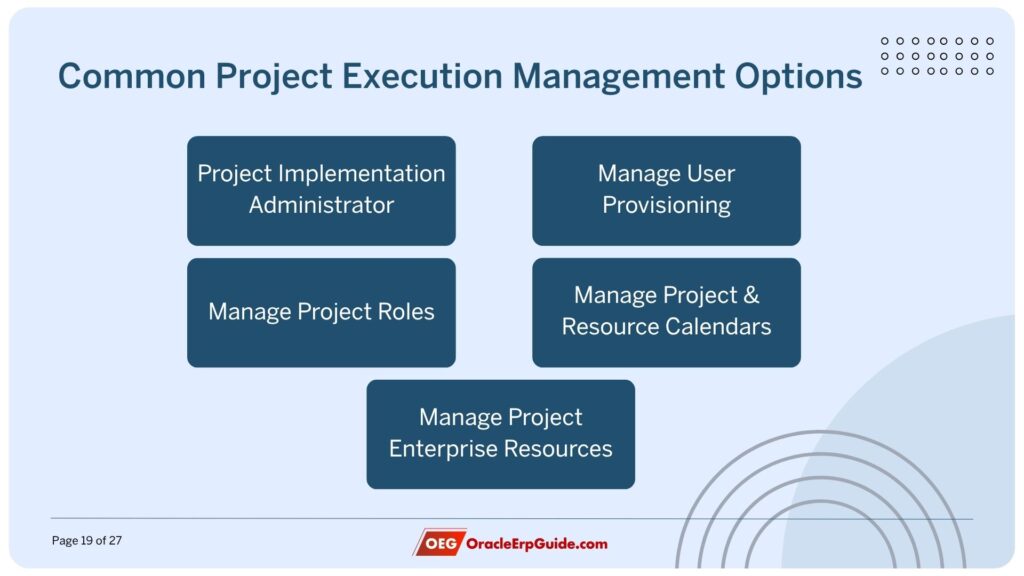
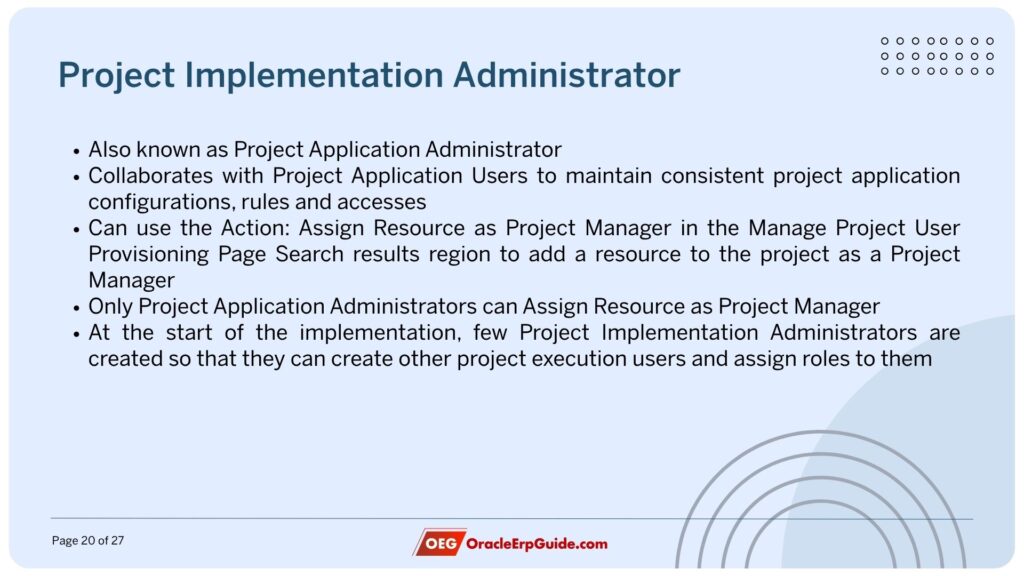
Roles in Project Execution Management
In Project Execution Management (PEM), roles define responsibilities and access within a project, distinct from roles in Project Financial Management (PFM) like Project Accountant or Billing Specialist. In PEM, key roles include the Project Execution Manager, who oversees projects, calendars, issues, deliverables, and changes, and the Resource Manager with similar responsibilities. The Project Team Collaborator tracks and reports progress, while Project Executives work within a project hierarchy, previously known as the Enterprise Project Hierarchy (EPS), which Oracle is replacing with a new Program Management model. Roles are further categorized into enterprise roles, granting access to specific work areas, and project roles, which define functions like functional consultants or database administrators. Oracle also allows roles to be refined with qualifications and keywords, enabling resource managers to search for qualified personnel. Additionally, roles can be distinguished by privilege levels, such as differentiating between junior and senior project managers based on their responsibilities and data access, ensuring precise role management within the project.
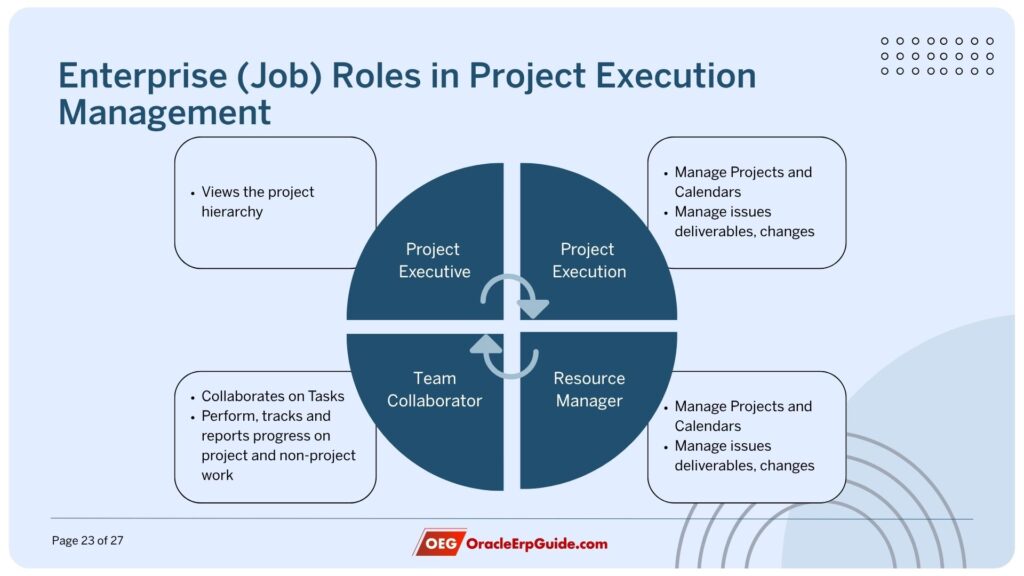
Project Roles
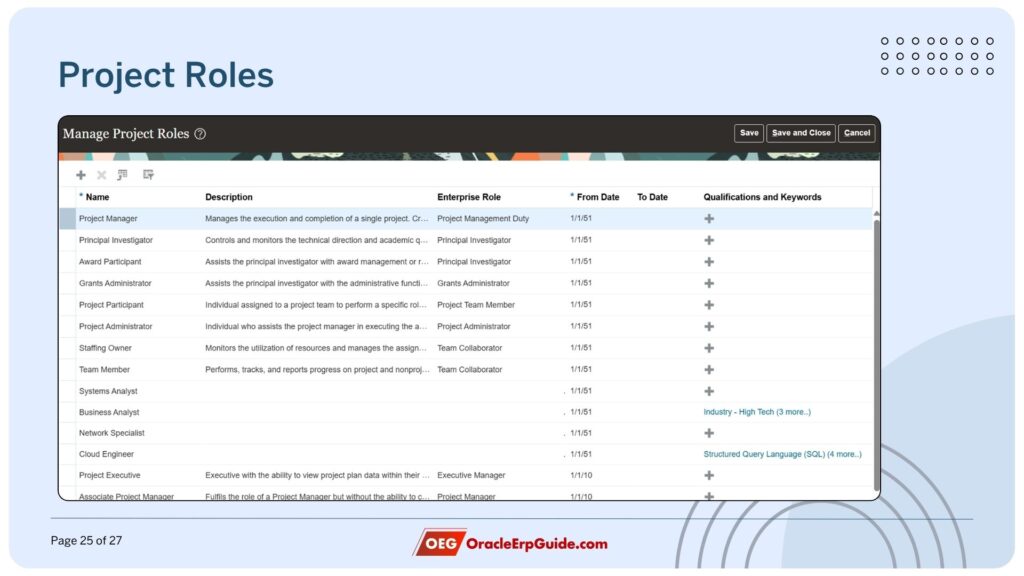
Project roles define the specific tasks a person performs on a project, such as Project Manager, Functional Consultant, Technical Lead, Database Administrator, QA Analyst, and Reporting Specialist. These roles can be linked to specific qualifications and keywords, which help resource managers search for the right individuals when a resource request is made. Examples of standard project roles, like Project Manager or Project Team Member, cannot be edited or deleted, but organizations can create additional roles to meet their specific needs. Project Application Administrators can maintain a standardized set of project roles across the organization, ensuring that qualifications for these roles are consistent, and helping in the process of finding and evaluating resources for various projects.
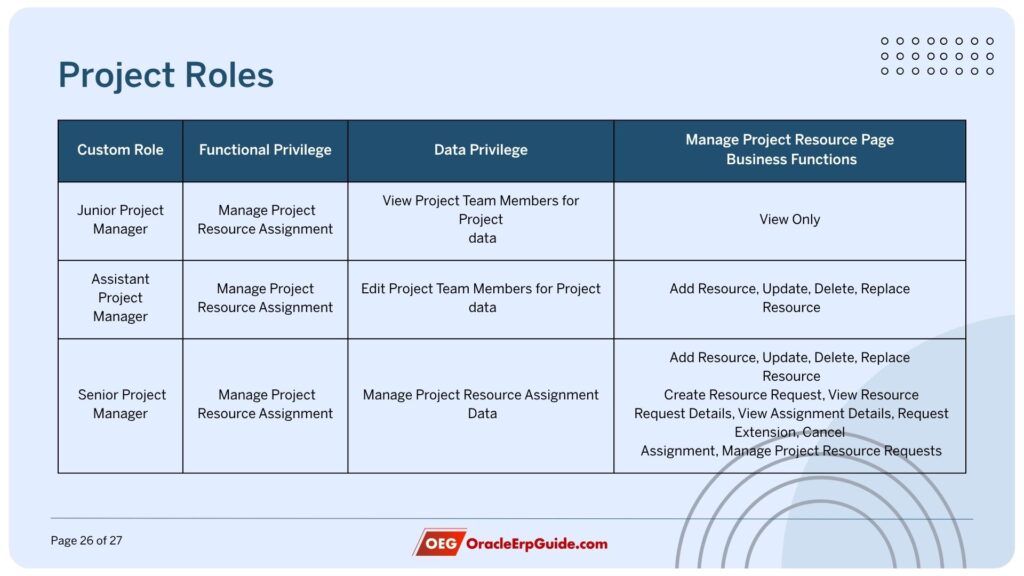
📊 Access Free Content Accross FIN, SCM, PPM, EPM, HCM, Fusion Technical
Learn Oracle Fusion Cloud. Explore our Free and Paid Courses.
💡 Get Free Access to:
✅ Video Recordings
✅ PDF Documents
✅ Practice Quizzes
✅ Live Sessions & Live Webinars (as per availability)
Create a Free AccountExplore Paid Courses ›


